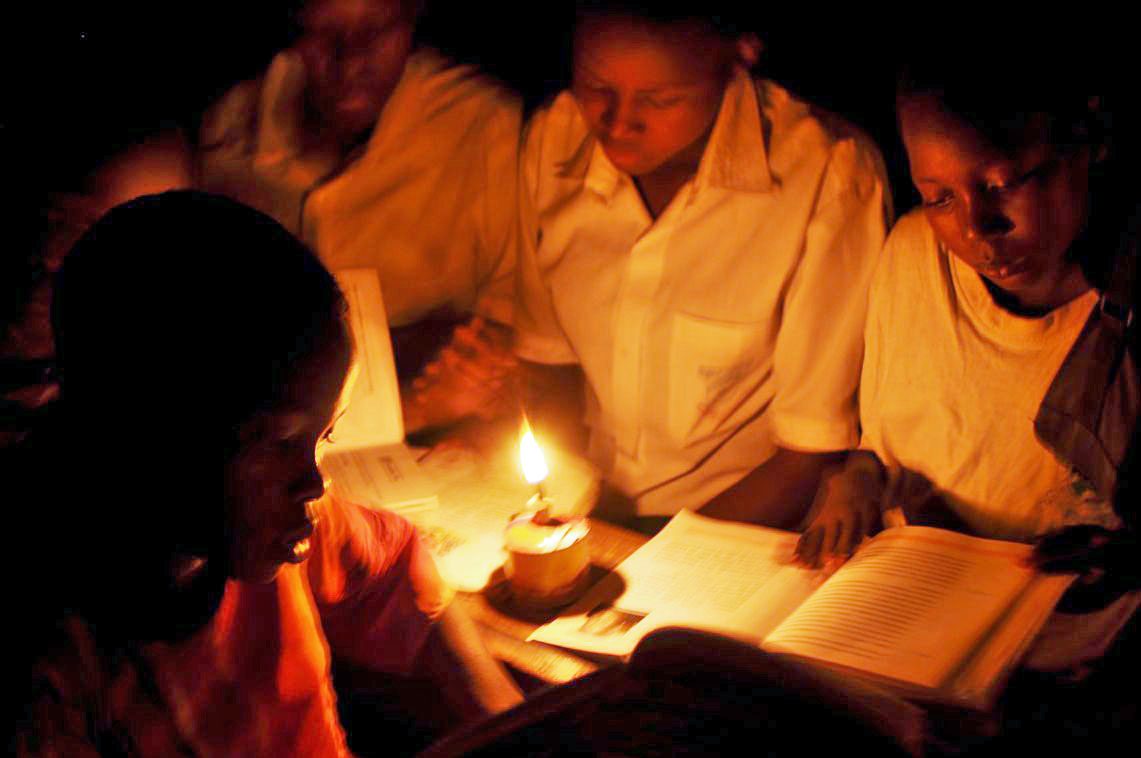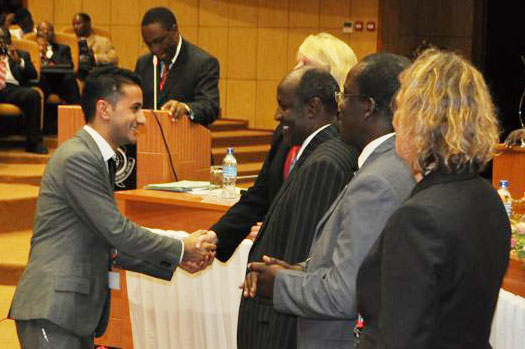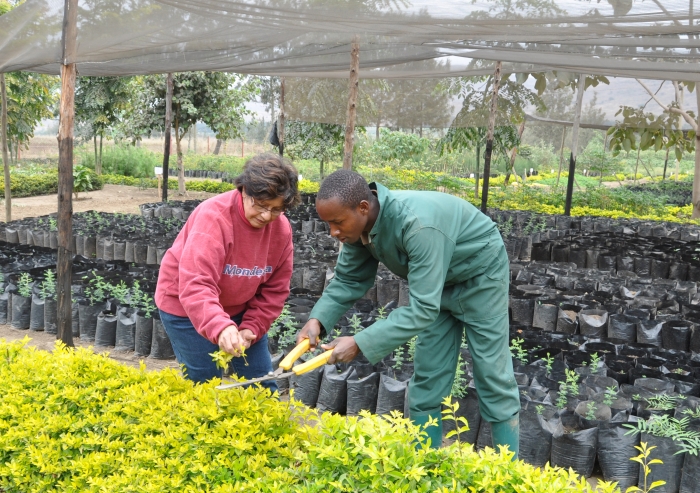 In the absence of electricity, students in a primary school classroom have to study using kerosene lamps. Courtesy of Naeem Mawji
In the absence of electricity, students in a primary school classroom have to study using kerosene lamps. Courtesy of Naeem MawjiFor years, village representative Kiboko waited desperately for electricity to reach Masurura, in northeastern Tanzania.
“We had a lot of milk that spoiled because we could not store it,” he said. “If we could store it in refrigerators and supply it to other villages, we knew we could make a small industry.”
Growing up in the nearby city of Musoma, Naeem Mawji knew he was one of the lucky few with electricity. Approximately 85 per cent of Tanzanians are unconnected to the power grid, according to the World Bank. Many turn to dangerous alternatives like kerosene lamps. Respiratory diseases from toxic kerosene fumes are a leading cause of death in the country.
 Mawji working with local villagers to install the support structure for a solar panel on top of the roof of the village community centre. Courtesy of Naeem Mawji
Mawji working with local villagers to install the support structure for a solar panel on top of the roof of the village community centre. Courtesy of Naeem MawjiMawji transformed his unease with the situation into action while he was studying at the University of British Columbia (UBC) in Vancouver. Having started with a small scale plan to install a few solar panels in Masurura, today the 24-year-old engineering student heads up a World Bank funded project to build a mini solar-powered electric grid in the village.
Mawji first started to think about solar energy as a solution to Tanzania's electricity woes during the Golden Jubilee Knowledge and Discovery Challenge held in 2007. Tanzania's abundant sunlight provides a safe, sustainable alternative to kerosene.
Mawji also saw electricity as a catalyst to transform Tanzania's economy. With 80 per cent of the country's workforce employed in agriculture, he knew that spreading electricity to rural areas would make a significant difference in the lives of the workers.
Masurura is a case in point. Access to electricity would also allow businesses in Masurura to stay open longer, connect people to the Internet, and facilitate entrepreneurship.
“Most of the people are farmers,” said Mawji. “With electricity, they can buy water pumps and small mills. This will dramatically increase productivity.”
 Mawji with teachers and a few students outside Masurura Elementary School, one of the places that received solar panels through Mawji's efforts. Courtesy of Naeem Mawji
Mawji with teachers and a few students outside Masurura Elementary School, one of the places that received solar panels through Mawji's efforts. Courtesy of Naeem MawjiIn 2008, Mawji worked with Dr Shafik Dharamsi, associate director at the UBC Centre for International Health, to turn his ideas into a workable plan. Under Dharamsi's guidance, Mawji founded Kwasha (a Kiswahili word meaning “to ignite”) as a community based project to develop solar power infrastructure in Masurura. Dr Dharamsi is full of praise for Mawji.
“Naeem is a focused, committed and tireless individual,” says Dr Dharamsi, recalling the time he worked with the young entrepreneur. “He has a clear vision, and a strong motivation to succeed without compromising ethical principles.”
In August 2009, Mawji travelled to Masurura to install solar panels in three key areas: the community centre, the medical dispensary, and a classroom at Masurura Elementary School. Word quickly got around and students of University Hill Elementary School in Vancouver raised funds for the lighting at Masurura Elementary School. Mawji raised another CAD $5 000 during his internship at Syncrude Canada Ltd.
Access to adequate electricity has raised the quality of life in Masurura. Village women no longer have to deliver their babies in pitch darkness. “The biggest problem at the medical dispensary was giving birth,” Kiboko explained. “We always had trouble at night.”
 Mawji explains his solar-powered mini grid project to Anil Cabraal, Senior Energy Specialist with the World Bank, at the Bank's Lighting Rural Tanzania Competition. Courtesy of Naeem Mawji
Mawji explains his solar-powered mini grid project to Anil Cabraal, Senior Energy Specialist with the World Bank, at the Bank's Lighting Rural Tanzania Competition. Courtesy of Naeem MawjiSince then, Kiboko noted that the student pass rate at the local school was the highest ever. He attributed this success to the students' ability to study after sunset. Even the social fabric of the village has undergone a change. The community centre now has a television where people gather to watch news and sports. “We enjoyed seeing the World Cup,” said Kiboko. Then with a laugh he added that watching TV is “the new thing to do” in the village.
All three locations in Masurura where the solar panels are installed are outfitted to charge mobile phones. Before electricity, most villagers relied on women to travel 20 kilometres to a nearby town, charge a car battery, and bring it back to Masurura to use as cell phone charger. Today, fees collected from the cell phone charging stations are reinvested to maintain the systems.
Seeing the improvement in village life prompted Mawji to found a social enterprise called Carbon X Energy. Recently, the company won $100 000 in seed money from World Bank's Lighting Rural Tanzania Competition. The grant is currently being used in a pilot project to connect 50 homes in Masurura to a solar-powered mini-grid.
In May 2010, Mawji returned to Masurura with two UBC students to lay the groundwork for the mini-grid. The team mapped the village and surveyed locals to predict what their electric consumption would look like. Mawji's family business is pitching in to help with construction.
 Mawji accepts an award from World Bank's Lighting Rural Tanzania Competition on behalf of his company, Carbon X. Mawji is using the $100 000 grant to connect 50 homes in Masurura to a solar-powered mini-grid. Courtesy of Naeem Mawji
Mawji accepts an award from World Bank's Lighting Rural Tanzania Competition on behalf of his company, Carbon X. Mawji is using the $100 000 grant to connect 50 homes in Masurura to a solar-powered mini-grid. Courtesy of Naeem MawjiMawji hopes to continue developing sustainable solar powered electrical systems throughout Tanzania. After finishing his studies in 2010, he plans to return to Tanzania. “I want to take this project as far as it will go,” he said.
And the spark lit by Mawji has already reached much further. Carbon X has taken its projects to six more villages in the region. “I want to help transform Tanzania's economy by bringing electricity to the core of the country,” said Mawji.






